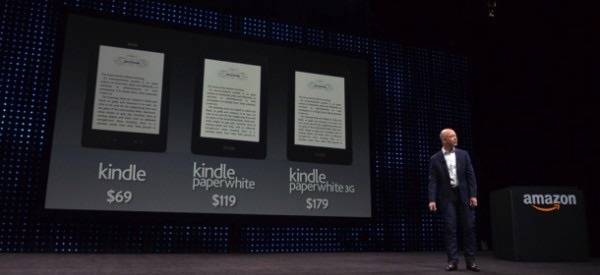
“The only thing more perfect than reading is more reading,” declared Amazon in a TV advert for its new Kindle eReader device. At a self-hosted event in Santa Monica today, Amazon launched new versions of its eReader and tablet products. Founder and CEO Jeff Bezos spent over an hour on stage, extolling the virtues of the new hardware. But perhaps more importantly, King Jeff showed that Amazon’s reign over the book publishing kingdom continues to advance.
While Amazon faces stiff competition in the tablet market, in the eReader market Amazon is dominant. The latest version of the Kindle eReader, named the Paperwhite, boasts a higher resolution, front-lit screen and will retail from $119. It’s a compelling upgrade, but the real reason for Amazon’s dominance in the eReader market isn’t the hardware – it’s Amazon’s continued innovation and market power in eBooks.
On stage today, Bezos confirmed that sales of Kindle eBooks overtook paper books around the beginning of 2011. Kindle eBook sales have trended steeply upwards since then.
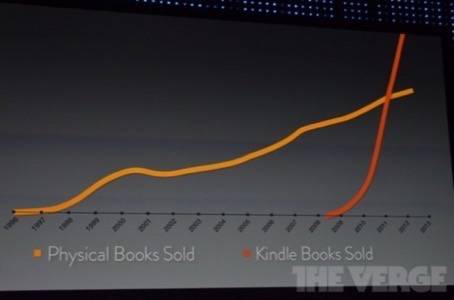
It’s notable that paper books have also grown, which is evidence of Amazon’s power in the book industry. As Borders and Barnes & Noble shut down more and more of their bricks-and-mortar stores, Amazon’s e-commerce business continues to increase sales – in both paper books and eBooks.
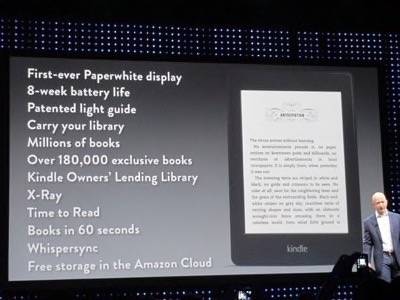
Another reason for Amazon’s increasing book sales is that people are buying more books. In a Guardian article last month, Amazon.co.uk described this as a “renaissance of reading.” Amazon claims this renaissance was ushered in by the Kindle. The UK arm of Amazon told the Guardian that “British Kindle users were buying four times as many books as they were prior to owning a Kindle.” That statistic was repeated by Bezos today.
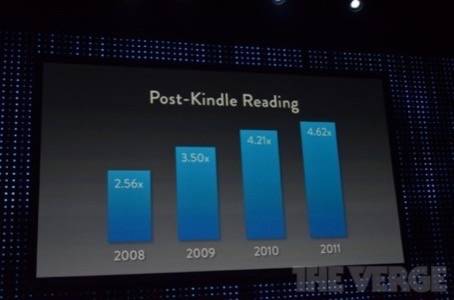
eBook Sales Now 15% Of Total Book Sales
According to BookStats 2012, a mid-year report from the Association of American Publishers and Book Industry Study Group, eBooks made up 15 percent of all trade book sales in 2011. In particular, in 2011 eBooks became the number one format for adult fiction.
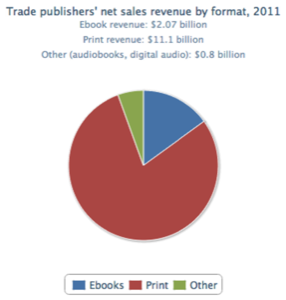
OK, most of that is 50 Shades of Grey, The Hunger Games and similar populist fare (says the snobbish english lit grad). But regardless, it’s undeniable that eBooks have finally taken hold of the publishing industry.
Amazon is profiting mightily from eBook trends – whether or not it caused them. Its new eReader, the Kindle Paperwhite, will very likely increase its market leadership.
It isn’t just eBook trends and new eReader hardware that is responsible for Amazon’s prime position in the book industry. The company is also shaking things up in book publishing and formats.
Kindle Direct Publishing
Amazon’s self-publishing service, called Kindle Direct Publishing (KDP), gives authors 70% royalties. In a remarkable statistic, Bezos revealed that 27 of the top 100 Kindle books are from the KDP program.
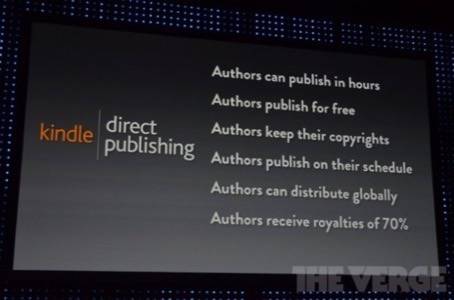
Kindle Singles
Kindle Singles are short-form books that typically sell for a couple of dollars each. Bezos positioned Kindle Singles as halfway between a magazine article (under 5,000 words) and a book (over 30,000 words). 3.5 million Kindle Singles have been sold to date, said Bezos, 35 of which have reached the Kindle Top 50.
Kindle Serials
Today Amazon introduced a new Kindle book format, which harkens back to an old literature publishing strategy: serials. Just as Charles Dickens used to publish his novels in monthly or weekly installments, Kindle authors can choose to release their books in serial form.
From the consumer’s point of view, buy the first “episode” and you’ll receive all future episodes as they are released.
Amazon is releasing eight serials initially, priced at $1.99 each (which includes all future installments). In addition, Charles Dickens’ books being re-released as Kindle Serials.
All Hail King Jeff
Add to the mix other Amazon offerings – like Kindle Owners’ Lending Library, Kindle-exclusive books and Kindle Highlights – and Amazon has a formidable service offering for books, of all kinds.
Amazon reigns in the book kingdom, which seems to be a good thing for readers and authors. For readers: books are cheaper than ever before, the eReader hardware is getting better (as evidenced by the Paperwhite Kindle launched today), Web services are becoming more flexible (serials, singles) and social (Lending Library, Highlights). For authors: there is an easy and attractive self-publishing option (KDP) and more flexibility in format.
Of course some of King Jeff’s subjects aren’t as happy: book publishing houses and competing book retailers probably see it more like The Spanish Inquisition, than a renaissance. But such is the price of progress. For now King Jeff reigns.
Photos: The Verge

















